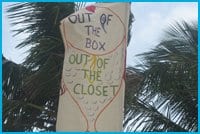As I watched the folks carrying “Marching for those who can’t” signs at this year’s Toronto Pride parade, my thoughts turned to another Pride festival I was blessed to be able to attend this year. In late May I travelled to Sri Lanka, my home country, to attend and perform at the second-ever Colombo Pride festival.
No, there was no march, but there was something just as important — a week of events organized by and for queer and trans Sri Lankan people in a country where queer and trans lives are illegal, a country on the brink of renewed civil war.
Section 365 of Sri Lanka’s criminal code makes queer sex a felony. Ironically, this only applied to men till 1995, when an amendment made the section gender-neutral. Although technically one has to be caught in the act of having sex to be arrested, the criminalization trickles down to mean harassment from the police and from people on the street, as well as a struggle by many lesbian, gay, bisexual and trans (LGBT) people for family and community acceptance. The tight-knit nature of life in Colombo and other cities and villages in Sri Lanka — where everybody knows your business, and your family’s, going three generations back — means negotiating a lot of gossip on the way to being queer or trans.
At the same time, Sri Lankan queers form a close-knit community of their own, one that is fiercely committed to their collective survival. There’s been a tremendous amount of movement since 1995, when Sri Lanka’s first LGBT organization, Companions On A Journey, was founded. Sri Lanka now boasts three well-established LGBT organizations: Companions, Equal Ground and the Women’s Support Group. Equal Ground organizes well-attended queer and feminist events and lobbies for the decriminalization of homosexuality and for queer and trans rights. The Women’s Support Group holds weekly meetings open to all queer women and trans people and assists queer women who are thrown out by their families and find themselves without support. Companions continues its groundbreaking work, bringing together queer and trans people and breaking the silence about queer life in Sri Lanka.
Last year Equal Ground held the first successful Colombo Pride, a one-night celebration. This year’s Pride was greatly expanded, featuring a full week of events ranging from video nights, theatre and poetry performances to a club night, culminating in the Rainbow Kite Festival where Sri Lankan queers partied on Mt Lavinia Beach and flew banners calling for queer and trans rights, freedom and self-love.
Previous attempts at organizing Pride have been met with violence. In 1999, the Women’s Support Group and Companions On A Journey organized a lesbian conference. The Island, a major daily paper, printed an editorial that called for rapists to be let out of jail for a day, “to show the women the real thing.” The conference was cancelled due to threats of violence.
As I met with different queer and trans rights organizations over the course of my recent visit, I was struck by the challenges they face and their strength in organizing around them. Groups are run out of homes, not in nonprofit offices. There is no government funding. Organizations are supported by grassroots fundraising and a few grants from international LGBT and women’s foundations, like Astraea and the International Lesbian And Gay Association. Books with queer content sent by overseas supporters have been held up by government censors and destroyed.
But the will to survive is strong. Queer Sri Lankans continue to organize for the right to exist, to work toward the transformation of Sri Lankan society into one where queer and trans people can live in freedom.
Being able to attend this event was a blessing in so many ways. Not only was I attending an historic event for queer Sri Lankans, I was also going home for the first time at 31. Like many Sri Lankans in the diaspora, my family wasn’t able to visit Sri Lanka during the 1980s and ’90s because of the ongoing civil war and the prohibitive cost of plane tickets.
I was going back for the first time, going back to find myself surrounded by hundreds of Sri Lankan queer and trans people. I drank Lion lager and partied on the beach and I was overwhelmed by how blessed I felt to be there. I was home, in every way that counted.

 Why you can trust Xtra
Why you can trust Xtra